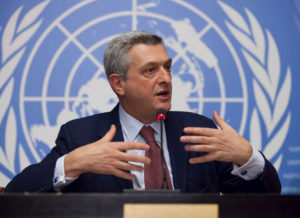New finance arrangements to help refugee hosting countries
An innovative new financing instrument to address refugee crises in middle income countries worldwide was announced by US President Barack Obama at his Leaders’ Summit on Refugees in New York last week.
In all, 86 per cent of the refugees under UNHCR’s mandate in 2015 were in low- and middle-income countries close to situations of conflict, many of which struggle to come up with sustainable means to manage the additional costs of hosting them.
The World Bank’s Global Concessional Financing Facility (GCFF) will help them to acquire key development financing while at the same time bridging the gap with organisations providing direct humanitarian assistance on the ground.

Filippo Grandi
Attending a high-level panel at the UN General Assembly – which ran parallel with President Obama’s meeting – UN High Commissioner for Refugees Filippo Grandi welcomed both the facility, as well as a $US50 million contribution from the United States.
“I believe that the GCFF is well positioned to support investment projects and initiatives that can support longer term growth, providing opportunities for both local and refugee populations alike in middle income countries,” Mr Grandi said.
“If more refugees and local communities can find employment, are free to trade or open businesses, they can contribute more to the economy and to their families. This will lessen pressure on government and humanitarian finances, permitting resources to be better and more efficiently targeted,” he said.
Since the Syrian crisis erupted in 2011, some 4.8 million refugees have been hosted by middle-income neighbours Egypt, Iraq, Jordan, Lebanon and Turkey. Worldwide, Turkey hosted more refugees – 2.5 million – than any other country last year, while Lebanon hosted more refugees compared to its population than any other country.
The GCFF ramps up to a global scale the Concessional Financing Facility for the Middle East and North Africa (CFF), which was launched earlier this year to support Jordan and Lebanon, the two middle income countries whose demographics have been most altered by hosting large numbers of refugees.
Mr Grandi said the CFF fulfils two important roles that were absent at the beginning of the Syria crisis five years ago. Firstly, it offers to governments the possibility of financing for investment projects that address the development needs of both the refugee population and the local host communities.
“Pursuing benefits for both refugees and local communities is surely an equity model that we should replicate elsewhere,” he said.
Mr Grandi said the new arrangements also sent an important signal of solidarity with the host country governments and population, so that the donor community recognises that the challenge will be long term.
The mobilisation of support for longer term programs in post-emergency refugee situations has long been an objective for UNHCR and other humanitarian agencies.
The CFF built on evidence derived from previous UNHCR-World Bank field research on refugee poverty in Lebanon and Jordan, the UNHCR said.
It demonstrated clearly the limitations of humanitarian assistance in responding to the impact of the conflict on both the local economy and refugee circumstances, it said.
UNHCR said it believed that such cooperation between humanitarian and development actors will prove increasingly effective in addressing protracted crises more sustainably.
Laurie Nowell
AMES Australia Senior Journalist












